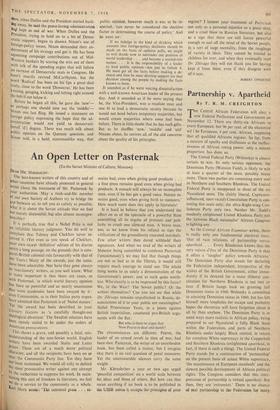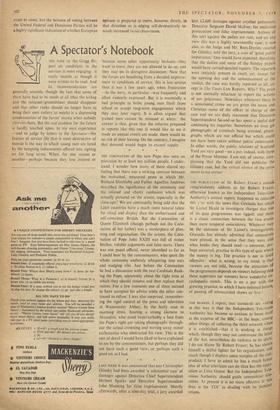Partnership v. Apartheid
By T. R. M. CREIGHTON
THE Central African Federation will elect a new Federal Parliament and Government on November 12. There are thirty-six Africans to every European, but 96 per cent. of the electorate wil I be European, 4 per cent. African, supposing that all qualified Africans register. So far, from a mixture of apathy and disillusion at the ineffec- tiveness of African voting power, only a minute proportion has done so.
The United Federal Party (Welensky) is almost certain to win. Its only serious opponent, the Dominion Party (Winston Field), is likely to win at least a quarter of the seats, possibly many more. These two parties are contesting every seat in Northern and Southern Rhodesia. The United Federal Party is unopposed in three of the six Nyasaland seats. The (fairly liberal, Capricorn- influenced, inter-racial) Constitution Party is con- testing five seats only; the ultra-Right-wing Con- federate Party only two. Neither Mr. Todd's modestly enlightened United Rhodesia Party nor the 'extreme Black nationalist' African Congress is fighting any.
As the Central African Examiner writes, there is really only one fundamental electoral issue. 'that of race relations, of partnership versus apartheid. . . . Every Rhodesian knows that the very raison d'etre of the Dominion Party is that it offers a "tougher" policy towards Africans.' The Dominion Party also stands for declaring the Federation independent, irrespective of the wishes of the British Government, either imme- diately if its demand for a more illiberal con- stitution for Northern Rhodesia is not met or later if Britain hangs back on granting full Dominion status in 1960. Welensky is committed to attaining Dominion status in 1960, but has left himself more loopholes for escape and probably hopes the electorate will have forgotten about it all by then anyhow. The Dominion Party is in some ways more realistic in African policy, being prepared to see Nyasaland a fully Black State within the Federation, and parts of Northern Rhodesia under largely Black control, in return for complete White supremacy in the Copperbelt and Southern Rhodesia (enlightened apartheid, in fact, if there is such a thing). The United Federal Party stands for a continuation of 'partnership' on the present basis of actual White supremacy, `the maintenance of European standards' and the slowest possible development of African political rights. The Congress considers that this inter- pretation of partnership is virtual apartheid. But then, they are 'extremists.' There is no chance of real partnership in the Federation for many years to come, but the balance of voting between the United Federal and Dominion Parties will be a highly significant indication of whether European opinion is prepared to move, however slowly, in that direction or is edging self-destructiVely to- wards increased racial chauvinism.



































 Previous page
Previous page